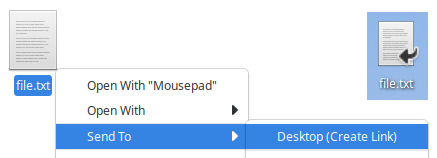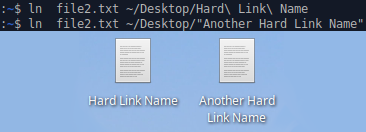For God so loved the world, that he gave his only begotten Son, that whosoever believeth in Him should not perish, but have everlasting life.
John 3:16 (KJV)
LAUNCHER TO A FOLDER Make the Command / Exec key =thunar /path/to/folder/. If there are spaces in the name of the folder, you’ll need to add quotation marks around the directory name in the launcher. Alternatively, add a backslash \ preceding each space in the name. Save launchers made in Mousepad (or other text editor) with the .desktop extension

[Desktop Entry]
Version=1.0
Type=Application
Name=My Folder
Comment=My Personal Documents
Exec=thunar /home/username/Documents/"My Folder Name"/
Icon=folder
Terminal=false
StartupNotify=true
If you want to use the default (Elementary-Xfce) folder icon, just put the word folder in the Icon key. You may also use most any image file you like by providing the file name and path to it.

[Desktop Entry]
Version=1.0
Type=Application
Name=My Directory
Comment=A Special Directory of Things
Exec=thunar /home/username/My\ Special\ Something/
Icon=/usr/share/icons/Humanity/places/64/folder.svg
Terminal=false
StartupNotify=true
CREATE A LAUNCHER TO A JAVA APP The Command / Exec key in a launcher for a Java app is java -jar followed by the path to the .jar file.
Make sure a Java app opens in OpenJDK by right-clicking the .jar, choosing Properties from the drop down menu and select Open with: OpenJDK Java 17 Runtime.

And while you’re there – give yourself permission to run the Java app. Click the Permissions tab and check the check box to Allow this file to run a program.


Password Dragon is a free, portable, cross-platform, password manager that runs in Java. If you would like Password Dragon for your own system, download it from here.

To make Password Dragon available globally (to all users), add the passworddragon folder to /usr/share. To have Password Dragon available only to one user; add the passworddragon folder to ~/.local/share/applications. Save launchers made in Mousepad (or other text editor) with the .desktop extension
[Desktop Entry]#Icon=/usr/share/passworddragon/Key-dynamic-color.png |

CREATE A LAUNCHER TO A SHELL SCRIPT Some applications are executed via shell scripts; files with the .sh extension.
Permission will need to be granted to execute the shell script
Method 1: Command-line
open a Terminal [Ctrl]+[Alt]+[T] and type:chmod +x /path/to/script.sh
Method 2: GUI
Right-click the script.sh, choose Properties from the drop-down menu, click the Permissions tab, and check the Program: Allow this file to run as a program check box.


Lux Delux is a cross-platform world-domination game inspired by the board game Risk® (but featuring over 1,000 maps) that starts via shell script. Play 30 games for free, buy for $9.99 US. Download here. Remember to save launchers made in Mousepad (or other text editor) with the .desktop extension
[Desktop Entry]# Exec=sh -c "cd /usr/share/LuxDelux/; ./LuxDelux.sh"Categories=GTK;Game; |
CREATE A LAUNCHER TO A WEBPAGE simply by adding the word firefox before the url in the Command / Exec key. Mozilla command-line arguments may be used as well, like -new-window and -new-tab. Remember to save launchers made in Mousepad (or other text editor) with the .desktop extension
Answers Research Journal is a professional, peer-reviewed scientific journal from the perspective of Creation and the global Flood within a biblical framework.
[Desktop Entry]
Version=1.0
Type=Application
Name=Answers Research Journal
Comment=Cutting-edge creation research. Free.
Exec=firefox -new-tab https://answersresearchjournal.org/
Icon=/usr/share/icons/URLs/coollogo_com-555020.png
Terminal=false
StartupNotify=trueCategories=GNOME;GTK;Network;WebBrowser;
iHeart Radio is the largest radio broadcaster in the United States. The launcher below will take you to their Christian & Gospel page featuring UP!, The Fish, K-LOVE, Christian Hits and Air1.
[Desktop Entry]
Version=1.0
Type=Application
Name=iHeart Radio
Comment=Music, Radio and Podcasts
Exec=firefox -new-window https://www.iheart.com/genre/christian-gospel-2/
Icon=/usr/share/pixmaps/entertainment/IHeart-Radio/IHeartMedia_Heart_Logo.png
Terminal=false
StartupNotify=trueCategories=AudioVideo;Audio;Player;
Positiv TV is a free 24/7 movie network owned and operated by the Trinity Broadcasting Network featuring stories of courage, compassion, hope, honor, redemption, and triumph.
[Desktop Entry]
Version=1.0
Type=Application
Name=Positiv TV
Comment=Positively Good Movies
Exec=firefox -new-window https://positiv.tv/watch-now/
Icon=/usr/share/icons/Positiv_TV_Network_Logo.png
Terminal=false
StartupNotify=trueCategories=AudioVideo;Audio;Player;
LINKS may be thought of as a type of launcher and they are quicker and easier to create. There are two different kinds of links; symbolic links (also known as symlinks, or soft links) and hard links. Note that links don’t have to be created on the Desktop, but for consistency, all examples shown below will.

Graphically Create a Symbolic Link to a file or folder. Right-click the original and choose Send To > Desktop (Create Link). The symbolic link appears on the Desktop and when double-clicked, will open what it’s linked to. Symbolic links can point to a file or folder on a different filesystem too. It’s important to note though, if the file changes names and / or locations (or is deleted), the symbolic link will be broken.

Command Line Create a Symbolic Link to a file or folder and give the full path to each. Because there are spaces in the name, put quotes around it. You can also prepend each space with a backslash instead. One advantage to the command line way of making a link is to change the name of the link right then.
Open a Terminal [Ctrl]+[Alt]+[T] and type:
ln -s /home/username/”New Folder” /home/username/Desktop/”New Folder Name”

Hard Links are indistinguishable from the files they link to. Hard Links contain an actual copy of the data and therefore if the original file changes names and / or locations (or is deleted), a hard link will not be broken. And, to delete a file that’s been hard linked to means you must delete all the hard links. A hard link must be on the same filesystem as the original file, can only be created in the command line and can only point to files – not folders.
Open a Terminal [Ctrl]+[Alt]+[T] and type:
ln file2.txt ~/Desktop/Hard\ Link\ Name
ln file2.txt ~/Desktop/”Another Hard Link Name”

More About Permissions Understanding and Using File Permissions from the Ubuntu Community Help Wiki. More About Script Permissions Setting up permissions on a script from Linux Bash Shell Scripting Tutorial. More about Launchers Launcher, Desktop Item Editor and Launcher Panel Plugin on Xfce Documentation. Also see How to add new menu items to XFCE menu on Internal Pointers. More about Links How to create a link in Linux on Computer Hope, How to Create Hard Links Linux? on Linux Hint, and What is the difference between a hard link and a symbolic link? on Ask Ubuntu.




